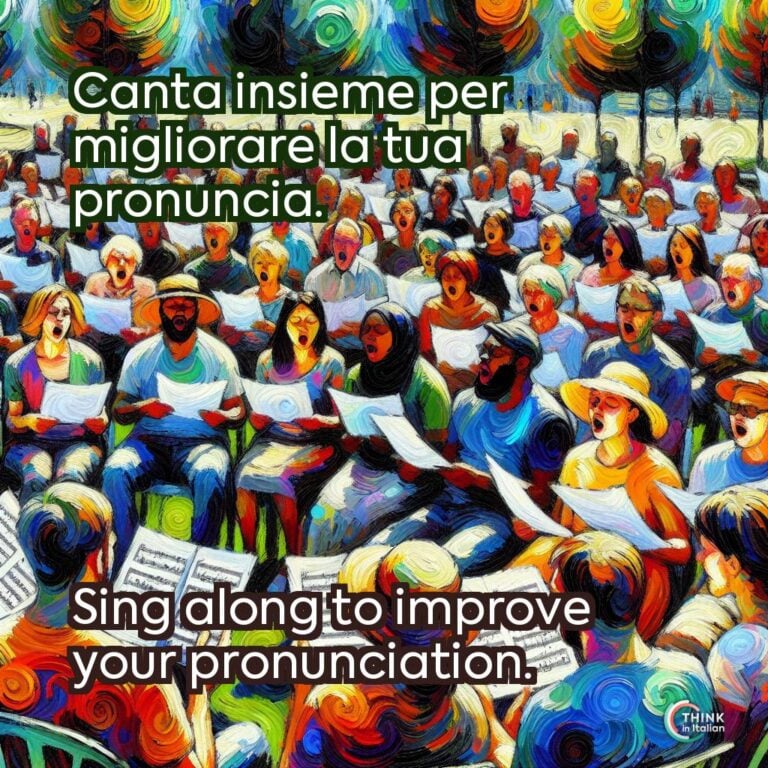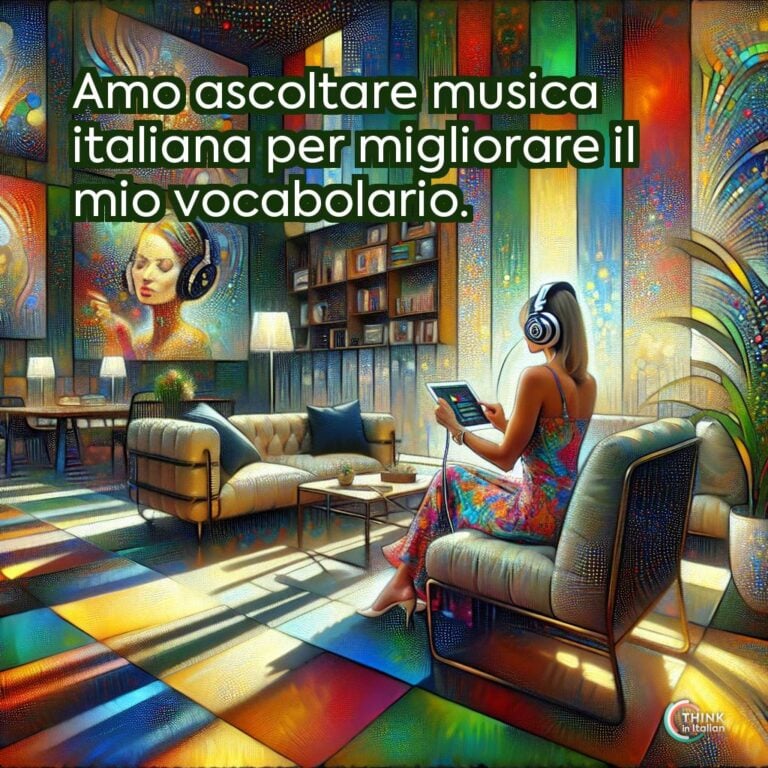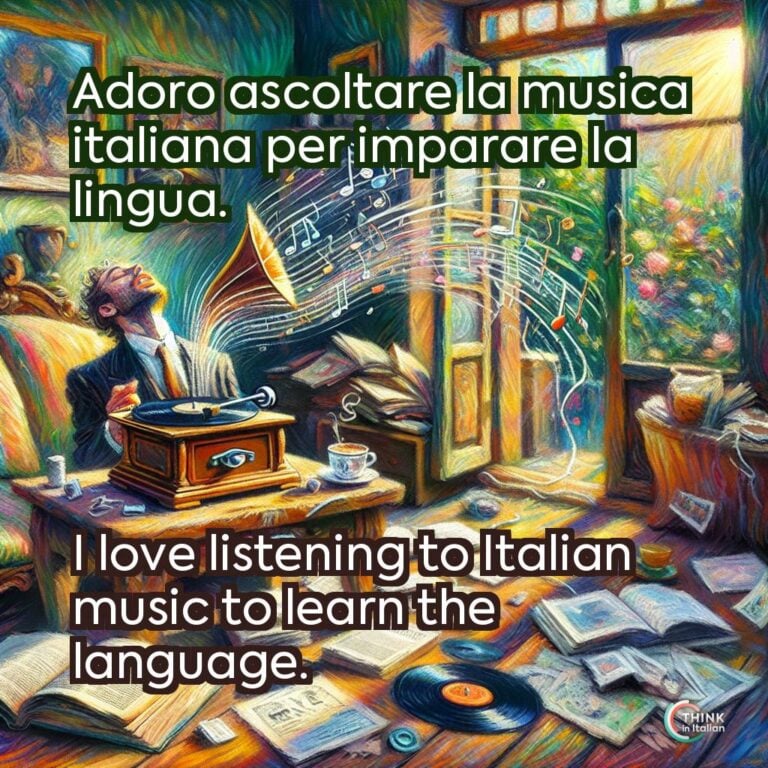Italian Songs for Beginners
Nel blu dipinto di blu – Domenico Modugno
“Nel blu dipinto di blu” literally means in “In the blue painted blue” and is a very classic Italian song, which is super popular abroad too.
I bet you already know at least one of the many verbs in the infinitive tense that are sung in this 1958 classic. This famous song has many verbs, useful for beginners who want to improve their vocabulary.
The famous singer, Domenico Modugno, born in the Italian region of Puglia, was inspired to write this song to celebrate his land, its sea, and blue sky.
Personally, I love this song because its lyrics give a feeling of freedom and light-heartedness.
Sapore di Sale – Gino Paoli
This 1960s summer hit is full of prepositions, and prepositions definitely are one of the hardest topics of the Italian language. Listen carefully and you’ll hear them in all their variations!
Un raggio di sole – Jovanotti
If you don’t know him yet, you have to listen to our beloved Italian singer Lorenzo Jovanotti (whose real name is Lorenzo Cherubini).
In this fun ballad he tells us about his complicated relationship with his girlfriend using a lot of different past tenses. In particular, you can hear the difference between “passato prossimo” and “imperfetto”.
Once you get to know this song, discover all the other popular Jovanotti songs, you will love his sound and his energy!
Un anno d’amore – Mina
Mina is definitely one of the most talented Italian singer of all time. With this song, you get to know the diva and her style while learning the future tense.
In this song, Mina warns her lover that he’ll miss her when she’ll be gone. Give the chorus a few listens and I promise you “ricorderai” (will remember) and “capirai” (will understand) just fine.
Almeno tu nell’universo – Mia Martini
This is undoubtedly one of Mia Martini’s most meaningful songs. It is about people’s inconsistencies: in a world full of “strange people”, there is no more space for feelings and love.
This song is extremely useful to learn the use of “si” pronouns in different contexts. In fact, this pronoun is not only found in reflexive verbs: there are many false reflexives that make use of it but have different meanings.
In this Italian song, for instance, they are used with a reciprocal meaning.
L’emozione non ha voce – Adriano Celentano
The text of this beautiful song is a confession of a man who is in love. He declares his difficulty in opening his heart and giving voice to his feelings.
The rhythm and music are very slow, as well as the pronunciation of the singer, so this is an easy Italian song for beginners.
Solo noi – Toto Cutugno
This is the song with which Toto Cutugno won Sanremo Music Festival in 1980. The single remained in the Italian top ten for several months. It is about a pair of lovers, their love, and the end of their passion.
Felicità – Al Bano & Romina Power
Felicità (happiness) is an album that was published in 1982 by Albano Carrisi and Romina Power. It is known all over the world thanks to its easy lyrics which tell about joy, satisfaction, serenity, and excitement.
It is a very useful song to learn how to make comparisons and learn new words of the Italian everyday vocabulary that are present in this text!
L’anno che verrà – Lucio Dalla
Choosing only one song by Lucio Dalla is very hard, but this is probably a song that every Italian knows and loves.
The lyrics use very basic and daily words, which makes is easy for everyone who listens to understand and follow the topic of the song.
Tutta mia la città – Giuliano Palma & The Bluebeaters
This is a cover of the original song of Equipe 84, a famous Italian group of the ’80s and the ’90s. We suggest Giuliano Palma’s version because it sounds a bit more contemporary, but it’s worth listening to the original version also!
With this song, you can improve the present, simple future, and also conditional tenses.
Vieni via con me – Paolo Conte
Written and performed by one of the greatest Italian songwriters, this song is considered almost like an Italian anthem.
Paolo Conte is very easy to understand as he speaks slowly, with a very clear Italian accent. This song is perfect to practice indicative verbs and for the use of prepositions.
His style is timeless, so even if this song was written in 1981 it is still current for the younger generation.
Buonanotte fiorellino – Francesco De Gregori
This beautiful lullaby could be sung to a baby, a lover, or just, as the name suggests, a flower.
This serenade is great to learn new Italian vocabulary, because it uses very simple words as well as diminutive forms like “fiorellino” (little flower) or “monetina” (little coin).
Improving the Italian “parole alterate” will help you understand different registers of the language, since these words frequently come into play when you want to use a kind language, or, of course, when you want to talk about small things.
Con te partirò – Andrea Bocelli
This is probably one of the biggest international hits in the history of Italian music.Con te partirò (“With You I Will Leave”) talks about a journey, which is presented in a romantic and poetic way. The artist dreams of rediscovering lost and new places thanks to the love of his partner in the journey of life.
The emotional value of this song has no time, but not only is it worth listening to (and learning it) for purely artistic reasons, but also for linguistic ones.
In fact, Bocelli marks the words slowly, making the words very easy to understand. This is what makes this song perfect for a beginner’s language level.
Nel blu dipinto di blu – Domenico Modugno
Domenico Modugno, born in the Italian region of Puglia, was inspired to write this song to celebrate his land, its sea, and blue sky. Personally, I love it because the lyrics conjure up a feeling of freedom and light-heartedness.
In this famous Italian song beginners can have a fun time with infinite verbs, as well as with easy Italian vocabulary.
Sapore di Sale – Gino Paoli
This 1960s summer hit is perfect to practice the present tense and the prepositions. If you listen carefully, you’ll hear every variation of prepositions!
Solo noi – Toto Cutugno
This is the song with which Toto Cutugno won the 1980 San Remo Festival. The single remained in the Italian top ten for several months.
The song is about a pair of lovers, their love, and the end of their passion, and it is very useful to practice the imperfective tense.
Felicità – Al Bano & Romina Power
This song is known all over the world, for its themes of joy, satisfaction, serenity, and excitement that people experience in a wave of optimism. The lyrics make use of comparisons to describe what you feel when you’re particularly happy.
Ma il cielo è sempre più blu – Rino Gaetano
I would recommend this song – and the following ones – for intermediate Italian language learners.
At first glance, the song lyrics seem to be optimistic and lighthearted. At a deeper level, this song actually highlights the issues and problems of Italian society in the 70s, such as corruption or social injustice.
The vocabulary is a bit more advanced, as well as some structures likechi ruba, chi lotta, chi ha fatto la spia (who steals, who fights, who snitched).
Azzurro – Adriano Celentano
Adriano Celentano was the first Italian songwriter who introduced rock’n’roll music in the country. This song is very popular also abroad and it is very representative of the Italian summer melancholy.
It is a perfect exercise to improve your listening comprehension and verbal structures which play with tenses and prepositions.
Non me lo so spiegare – Tiziano Ferro
Tiziano Ferro, one of the most appreciated Italian singers abroad, is famous for his romantic songs, as they are all about love, feelings, and complicated relationships.
This song is particularly interesting if you want to deepen your knowledge of idiomatic expressions and Italian common phrases like “non me lo so spiegare” (I can’t explain it).
La canzone del sole – Lucio Battisti
As one of Italy’s most famous and most influential musicians, Lucio Battisti is often selected by Italian teachers as a starting point for discovering the country’s rich musical heritage.
La Canzone del Sole is clear, comprehensible, and tells the story of two lovers meeting again after years apart. However, it makes use of a quite researched vocabulary that might be complex for beginners.
La cura – Franco Battiato
Without any doubt, this is one of my favorite Italian songs ever. Franco Battiato is a musical hero in Italy, so if you want to speak the language you must at least be able to recognize the name when he comes up in conversations.
As well as trying out many musical styles, Battiato often features philosophical and esoteric themes in his type of music. For this very reason, his songs are not advised to beginners, because of their complex vocabulary.
Voglio una pelle splendida – Afterhours
The lyrics for this rock ballad is perfect to practice the imperative mood. At the same time, its repetitiveness makes it easy to retain new vocabulary.
50 special – Lùnapop
This one is one of my all-time favorite songs. If you go to an Italian karaoke night you can be sure you’ll hear (and sing!) this song.
As you might already know, 50 Special is a kind of Vespa, the popular Italian scooter manufactured by the Italian brand Piaggio, which has become one of the symbols of Italian culture.
This super cheerful song sings about the good times you have when riding a Vespa and the singer, in the beautiful, summery landscape of his native Italian region, Emilia Romagna.
I bet you’d love to travel around the “colli bolognesi” with a Vespa too!
Ragazzo fortunato – Lorenzo Cherubini
Ragazzo fortunato (lucky boy) tells the story of a young boy who feels grateful for the little things in life. This is a song you want to sing when you feel happy about life, and Italians love celebrating life!
Personally, I love this line of the song
Se devo dirla tutta, qui non è il paradiso ma all’inferno delle veritá, io mento col sorriso.
If I have to say it all, here’s not the heaven, but in this hell of truths, I lie with a smile.
Despite its cheerful and upbeat rhythm, this song carries an important message to make people aware of social issues and injustice.
Certe notti – Ligabue
This song describes a casual Italian night amongst friends but it has different levels of interpretation.
On the one hand, it celebrates the lightheartedness of Italian people, while, on the other hand, it draws attention to the shallowness of some people’s lives.
Ligabue is one of the most famous Italian pop-rock singers, and his songs are always full of interesting metaphors, which make its lyrics not so accessible to beginners.
Vado al massimo – Vasco Rossi
“Vado al massimo” is an evergreen Italian song by Vasco Rossi. This is the kind of song that you’d listen to give yourself a boost of energy and enthusiasm.
The lyrics of this song are not particularly meaningful or deep but they play a lot with word sounds and assonance of words.
Vasco Rossi is a real rockstar in Italy and if you like pop-rock music, you should definitely listen to his songs.
Perdono – Tiziano Ferro
Perdono means “forgiveness” and, as you may infer from the title, this song is all about forgiveness within a love story. It is not surprising that most Italian popular songs are love songs because, Italian people are fairly romantic and passionate.
From a linguistic point of view, this song is perfect to practice Italian pronunciation, given its speed. If you can sing this song, consider yourself an Italian pronunciation master!
Bambina impertinente – Carmen Consoli
We are now ready to sing harder songs, so if you are an advanced learner, this section is perfect for you.
This song by Carmen Consoli is full of orders, commands, and instructions, therefore perfect to practice all types of imperatives. As if this wasn’t enough, there also is some subjunctive here and there, so there’s no excuse not to get practicing.
Il congiuntivo – Lorenzo Baglioni
Well… The title says it all! This hit is a reminder that not only foreign students have problems with congiuntivo.
Lorenzo Baglioni’s conjugation of the present, past perfect subjunctive, and past perfect and imperfective is a grammar teacher’s delight.
This song is very useful to those who struggle with verb tenses, and I bet it will make you feel better to hear someone singing about how difficult it is even for an Italian native speaker to use the subjunctive correctly!
Salirò – Daniele Silvestri
Daniele Silvestri’s songs are well known for their rhythm and groovy melodies. He is politically committed and there is often a message within his songs.
His language is quite metaphoric, so it would be hard for an intermediate or a beginner level to fully grasp the meaning of the lyrics.
In this song, we find many verbal structures: the simple future “salirò” (I will go up) and the use of the conditional tense “preferirei” (I would prefer).
La vita com’è – Max Gazzè
Max Gazzè is a pop-rock Italian musician. Once you listen to them, his song will be stuck in your head for a long time!
Here you will listen to many “if clauses” to create hypothetical phrases, such as “se fossi” (if I were), as well as some complex Italian expressions like “prendere la vita com’è” (take it easy) or “ammazzare il tempo” ( killing time).
Giro giro tondo (Turn Turn Around)
If you were a little Italian boy or girl, this would be one of the very first songs you’d learn in school.
It’s the equivalent of the English playground song “Ring Around the Rosie,” which many speculate to be a song about the Black Plague. (Which is ironic since the song has fun connotations for today’s children.)
This song is easy as it gets. The melody is charming with a simple sentence structure.
Actually, there are many versions of this popular song. There’s the standard one with the hen, another involving a wolf at the door, and even one talking about Mussolini’s grandchildren.
The variety of versions can only mean good news for your vocabulary, as you’ll be able to sing the same tune and have many different words accompany it.
In fact, you can make your own Italian version and just use the standard melody as a template!
Il coccodrillo come fa? (How Does the Crocodile Go?)
https://www.youtube.com/watch?v=MfFM_QJvXyM&ab_channel=IlPescatoreDiAsterischi
Remember when you were a kid and adults would ask you what certain animals sounded like, and then they would laugh with delight when you went “woof! woof!” or “meow”?
As it turns out, this is a universal phenomenon and Italian kids have a tune that helps them remember animal names as well as the sounds they make.
“Il coccodrillo come fa?” is a cheerful song asking a very important question: “What sound does the crocodile make?” And along the way, it will definitely teach you a vocabulary word or two.
Actually, this song teaches you a little of everything: useful interrogatives, nouns, pronouns, and verbs are peppered throughout it.
And if you want to milk it for all its worth, it would be worthwhile to do a line-by-line study.
(A word of warning, though: By the end, you will still have no idea what sound the crocodile makes.)
Attenti al lupo (Beware of the Wolf)
This song is like a fairytale because it provides a moral lesson.
The bad wolf in the song is the representation of evil and danger.
On the other hand, the forest represents life, with its complicated and sometimes intricate characteristics, where one wanders cautiously.
But, as in all fairytales, there is an object to be protected or brought to safety. This time it’s a dream and it’s kept in a little hat.
Is Music Useful to Learn Languages?
Music is a highly effective tool language learning; it provides a fun, engaging, and effective way to improve various language skills.
Here are the main reasons why, for me, integrating music into your language study can be beneficial:
- It improves memory: Music helps with vocabulary retention, because rhythm and melody help embed language patterns in your memory, making it easier for future recall.
- It enhances pronunciation: Listening to music allows you to hear the natural flow of the language, including intonation, pronunciation, and rhythm. Singing along can further improve your accent and speech fluency.
- It increases motivation: Music provides a multisensory learning experience, which can be more engaging than traditional study methods, making the learning process more enjoyable. A positive emotional connection to music can increase motivation and make the learning experience less of a chore.
- Cultural exposure: Songs often contain cultural references and everyday language use, which provide insight into the cultural contexts in which the language operates. This can deepen your understanding of both the language and its culture.
- It reinforces repetition: The repetitive nature of songs makes them ideal for repetitive learning, which is essential for language acquisition.
- It expands vocabulary and grammar: Songs can introduce new vocabulary and grammatical structures within a meaningful context, helping you to learn and understand how to use new language constructs effectively.
Learn Italian Songs
For me, it is very useful to listen to and sing Italian songs to learn Italian, because the Italian language is rich in emotions and cultural references, which makes the learning path more engaging.
I love music in general, and I might be biased because of being Italian, but I really believe that Italian music is amazing. Have you ever heard of “Italian Cantautorato“?
Here are the main reasons why I believe you should learn Italian songs to learn the Italian language:
- Diverse vocabulary: Italian songs cover a wide range of themes, from love and heartbreak to social issues and everyday life. This diversity exposes you to various vocabularies that might not typically appear in standard textbooks.
- Cultural insight: Italian music is deeply intertwined with the country’s cultural and historical context. Listening to Italian songs can provide a deeper understanding of Italian culture, crucial for mastering the language beyond its technical aspects.
- Engagement with language: As I mentioned before, Italian music emotionally engages people. This is something that music does in general, but the depth of Italian songs is something special!
- Dialects use: Many Italian songs are written in Italian dialect, and include slang and idiomatic expressions. This real-world application of the dialect can be more engaging and informative than textbook examples of standard Italian.
Life Sounds Better with Italian Songs
Do you want to know something fun? Music is how I learned English when I was younger: I used to spend my afternoons listening to songs on YouTube, together with their lyrics and translations.
That helped me learn new vocabulary every day, properly pronounce English words, and understand slang and sayings.
Let’s be honest: is there anyone in the entire world who does not like music? I strongly doubt it. For me, there is no day passing by without having listened to at least one song.
If you are like me, make use of Italian songs to learn Italian! I promise you this will help you learn Italian fast, with less effort, and in a more engaging way!






